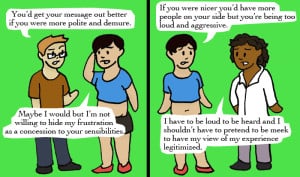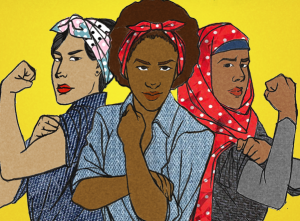
Source: Getty Images
Word in the spiritual sphere is that there are no experiences that come to us unless and until we summon them our way.
It also goes that we do so either to learn a lesson we’ll need for the rest of our journey, or to re-visit a spiritual tenet we’ve yet to fully learn.
I don’t agree.
I believe that we can be victims of senseless acts of wicked energy gone rogue.
I also believe that love and expression can help us survive and even thrive through emotionally rigorous times.
And that’s what this article is about.
Even if you do believe that we call every experience into being, perhaps you and I can agree that it damn sure doesn’t feel like something we would bring into our reality when you-know-what hits the fan, and we’re covered in the stink and the matter of the thing.
Case in point: One of my best friends in the world went through two incredibly difficult experiences in the past couple of years. First, she lost a loved one, and then her relationship with her longtime partner ended in the most abrupt, disturbing manner.
My friend is one of those ever-jovial optimists upon whom I’ve called many a time to remind me how not to go too deep down Shit’s Creek. And it was so disheartening to watch her be immersed in feelings I’d never attributed to her before.
Sadness, despondence, defeat, and a cocktail of other deep gash emotions stomped around in her words and her world, and I felt the need to do something to fix the ways she felt.
Have you had that experience? The one where a friend or family member is in the thick of their emotional thing, and you want to be there for them, but you don’t exactly know how being there should look or feel?
I have. And as an Emotional Wellness Educator, I tend to get particularly unnerved when I can’t readily identify the fix-a-feeling brew for a loved one’s emotional ailment.
So, is this the bit of information that’s going to finally tell you how to solve that? And if there has to be a next time, will you then be able to help your friend get through it faster? easier? both?
Maybe not.
But I will offer you what I’ve learned over the years in my personal life and my professional focus about processing emotions and holding space for healing to occur.
Here’s the overarching premise behind everything I share with you going forward:
It’s not about them; it’s about you. More specifically, it’s your human tendency to avoid pain and to seek pleasure.
Freud, who I certainly don’t think got it right in all his assertions, explains this particular tendency well: Essentially, the id – which represents our most primitive, unconscious mind – seeks pleasure, and as such, steers us away from discomfort or pain of any sort.
This is not confided to physical pain, and is therefore highly relevant in our fix-a-feeling dilemma.
When your friend is struggling emotionally, it’s not just that you want them to feel better.
You want to avoid feeling bad, too. It’s your nature.
If you can accept that, you can take in what follows, and see if and how it flows for you and yours.
1. Say Attention
This is simply about reminding them that you are there for anything they might need.
Instead of just paying attention, you make it a point to verbalize your intention to offer any help you can.
Say it often, and listen with an open heart and no immediate expectations of how they should proceed.
A huge part of saying attention for me was to also be honest about how I felt – but with compassion, not expectation.
For example, when my friend expressed that she might go back to her partner, despite the betrayal and disrespect, I told her exactly how I felt about it. I reminded her of who she was and is, and I told her why I thought that was not an emotionally sustainable choice.
I could have stopped there, but that would’ve been an id move.
Instead, I also told her that I would be there for her no matter what she chose, and that she had the right to search for and work to preserve what felt like love to her.
2. Be an Echo
Consider yourself a reflection of what they are feeling, not a potential solution to their problem.
When I was struggling with how to be there for my friend, I found that I could address my need to be “doing” something by checking in with her often, and offering a space where she could express whatever she was processing.
I listened, I asked for clarification, and I left space for her to just feel however she felt. I only offered my suggestions when she asked, and she later told me that meant a lot to her.
That might just be what your friend needs – the benefit of your listening ear, and your verbal nod as they process their emotions out loud.
Resist the urge to counter your friend’s feelings with logic or advice, as it may cause them to pull away from you over time.
Another way you can be an echo is to remind your friend of the everyday things they typically enjoy.
Did you used to call each other after episodes of Breaking Bad? Would you typically go get smoothies or wine on a Friday evening? Whatever activities were part of your weekly or monthly to-dos should be preserved as much as possible.
Also, don’t assume what whenever you get together, you always have to talk about “the thing.” Your friend might appreciate just being his/herself without having a pseudo counseling session every time you connect. Thought it may seem odd, or like you’re avoiding a hovering issue, try to take cues from your friend about what they might want to talk about, instead of automatically bringing up their issue.
I used to talk to my friend about the latest dancehall music, juicing recipes, killer leg workouts, and funny Instagram posts.
Basically, I helped her see her feet in the clutter by reminding her of what her old, normal life felt like, as she worked toward creating a new one.
That new normal needed to include both her old self and the new self that was/is being developed as a result of the changes she had experienced, and that’s a lot of work!
Being an echo can a great way for you to help them clear the space for that work to take shape.
3. Put Process Over Comfort
Amidst the emotional rigors of her losses, my friend was also in the middle of changing her relationship with her body by eating differently and exercising consistently. Through a steady, healthy series of changes, she became healthier, more energetic, and more in touch with her body than she had ever been.
I was genuinely impressed with how she stayed aligned with her new habits, and I stated how she could sprinkle elements of that sense of resolve into her process of change and acceptance.
Eventually, she did just that – on her own terms, and in her own time.
That taught me the importance of getting comfortable with both my own discomfort around the lack of a clearly defined solution.
Once I accepted the discomfort, I was able to get out of my own head and instead just be there as she began to identify with her own unstructured, beautifully chaotic process for acceptance, and eventually, healing.
Had I pushed too much, or tended to id more than to her, she would have had less room for the introspection and scope of intuitive work she needed to do to move forward organically.
—
At the core of your communication should be an ongoing assertion that your friend has full access to your ears and your heart.
Echo their sentiments and hold sacred space with them to feel however they feel, without judgment or need for action. Respect their process over your need to regain a full sense of comfort within your relationship.
As you go through your side of the process (because you are, after all, having your own experience in all of this too), you may bump up against a series of what-can-I-says, and those-probably-aren’t-the-best-choices.
In those cases, just do your best to make it about your friend, and trust that they are fully equipped to be divinely guided through whatever experience they are having.
Just hold that space with your friend while checking your id to ensure that you, not it, is setting the intention behind every exchange you share.
Every word you speak, every hug you offer, and every bit of the energy you create with your friend as they work through their emotional struggle, can serve as part of their elixir for healing their hurt – if you can just be there without fixating on the fix.
Want to discuss this further? Login to our online forum and start a post! If you’re not already registered as a forum user, please register first here.
Akilah S. Richards is a Contributing Writer for Everyday Feminism. She is a six-time author, digital content writer, and lifestyle coach who writes passionately about self-expression, womanhood, modern feminism, location independence and the unschooling lifestyle. Connect with Akilah on Instagram, Tumblr, or her #radicalselfie e-home, radicalselfie.com. Read her articles.
Search our 3000+ articles!
Read our articles about:
Our online racial justice training
Used by hundreds of universities, non-profits, and businesses.
Click to learn more
Most Read Articles
- « Previous
- 1
- …
- 30
- 31
- 32



















